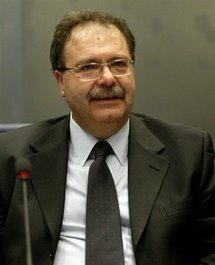
Tarek Mitri
The bill, adopted by a massive 395-3 majority, calls for punitive measures against television networks in the Middle East seen as fueling anti-American hatred.
It asks President Barack Obama to report in six months "on anti-American incitement to violence in the Middle East, and for other purposes."
Moroccan Information Minister Khaled al-Nasseri said Sunday the Arab position was based on the refusal to accept "interference," while stressing they "reject any incitement to violence or terrorism by any Arab satellite channels."
The networks listed include Al-Aqsa, the station of the Islamist Palestinian movement Hamas, which broadcasts from the Gaza Strip, and Hezbollah's Al-Manar.
Al-Manar is on a list of terrorist organisations announced in December 2004 by the United States, where the television has lost its feed and is banned from broadcasting.
Hezbollah is considered a terrorist organisation by the United States and its key Middle East ally Israel, although the Shiite movement is a major political party in Lebanon.
"Freedoms play a big part in Lebanese life and media freedoms are evident in its pluralism," Lebanese Information Minister Tarek Mitri said.
"We insist on media freedom and reject of any restrictions on it," said Mitri.
On January 9, Lebanese President Michel Sleiman urged the United States to reverse the decision during talks with US Senator John McCain.
---------------------------------------------------------------------------
It asks President Barack Obama to report in six months "on anti-American incitement to violence in the Middle East, and for other purposes."
Moroccan Information Minister Khaled al-Nasseri said Sunday the Arab position was based on the refusal to accept "interference," while stressing they "reject any incitement to violence or terrorism by any Arab satellite channels."
The networks listed include Al-Aqsa, the station of the Islamist Palestinian movement Hamas, which broadcasts from the Gaza Strip, and Hezbollah's Al-Manar.
Al-Manar is on a list of terrorist organisations announced in December 2004 by the United States, where the television has lost its feed and is banned from broadcasting.
Hezbollah is considered a terrorist organisation by the United States and its key Middle East ally Israel, although the Shiite movement is a major political party in Lebanon.
"Freedoms play a big part in Lebanese life and media freedoms are evident in its pluralism," Lebanese Information Minister Tarek Mitri said.
"We insist on media freedom and reject of any restrictions on it," said Mitri.
On January 9, Lebanese President Michel Sleiman urged the United States to reverse the decision during talks with US Senator John McCain.
---------------------------------------------------------------------------









 Home
Home Politics
Politics









